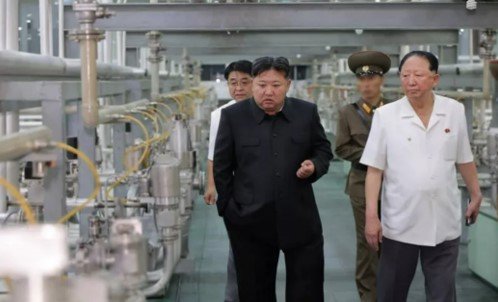Key Highlights:
- North Korea has disclosed a new uranium enrichment site, indicating an expansion of its nuclear weapons program
- China and Russia, key allies of North Korea, may play more assertive diplomatic roles or use the situation to leverage global influence
- The U.S. and its allies face renewed security concerns, potentially escalating military presence in the Asia-Pacific region
The recent revelations by North Korea regarding the discovery of a new uranium enrichment site, coupled with leader Kim Jong Un’s renewed calls for expanding the nation’s nuclear arsenal, have reignited fears of escalating tensions in global geopolitics. This development is a clear sign that Pyongyang is doubling down on its nuclear ambitions, potentially altering the dynamics of peace and diplomacy in the Asia-Pacific region and beyond. In this article, we examine the key facts surrounding this announcement and its ramifications on global security.
North Korea’s Uranium Site Revelation
North Korea’s announcement of a new uranium enrichment site comes at a time when the country is already suspected of possessing enough fissile material to build dozens of nuclear warheads. According to various intelligence estimates, North Korea has between 40 to 60 nuclear warheads as of 2023, with the capability to produce more due to its expanding plutonium and uranium enrichment programs.
Kim Jong Un, in a recent statement, underscored the need for “further strengthening” of North Korea’s nuclear arsenal, aiming to bolster both its deterrent capabilities and its position in international negotiations. This uranium site revelation suggests North Korea is not only seeking to increase the number of weapons but also improve the quality of its arsenal through advanced technology.

Photo: Korean Central News Agency
Impacts on Global Politics and Peace
Escalating Tensions with the United States and Allies
North Korea’s latest move could reignite diplomatic tensions with the United States, South Korea, and Japan, all of whom see Pyongyang’s nuclear ambitions as a grave threat to regional security. U.S. military officials have repeatedly expressed concerns about North Korea’s nuclear developments. The discovery of this new site intensifies pressure on the Biden administration to adopt a more aggressive stance, perhaps even pushing for additional sanctions.
Historically, Washington’s attempts to negotiate nuclear disarmament through summits and talks with North Korea have yielded limited results. Kim Jong Un’s renewed emphasis on weapons development signals that Pyongyang is unlikely to agree to significant denuclearization measures anytime soon. In response, the U.S. and its allies may increase joint military exercises in the region, further escalating tensions.
Impacts on China and Russia’s Foreign Policy
China, North Korea’s primary ally, and Russia, both of whom have vested interests in regional stability, are also caught in a delicate balance. Beijing has historically provided economic support to Pyongyang, while Moscow has deepened diplomatic relations in recent years. Both countries, particularly China, may be forced to take a more assertive diplomatic role to prevent the crisis from spiraling out of control. However, with rising U.S.-China tensions over issues like Taiwan and trade, Beijing may choose to leverage its relationship with North Korea as a bargaining chip in broader geopolitical negotiations. For Russia, which has grown closer to North Korea amid increasing isolation from the West due to the Ukraine conflict, North Korea’s actions may serve as a means to pressure the West.
Impact on Nuclear Non-Proliferation Efforts
North Korea’s uranium site revelation deals a significant blow to global nuclear non-proliferation efforts. The country’s defiance of international norms, along with its refusal to engage in meaningful dialogue, weakens the international treaties and frameworks designed to prevent the spread of nuclear weapons. This includes the Treaty on the Non-Proliferation of Nuclear Weapons (NPT), of which North Korea withdrew in 2003.
Other countries, particularly Iran, which has been locked in nuclear negotiations with the West, could view North Korea’s actions as precedent-setting. If North Korea continues its nuclear advancements without significant pushback, it could embolden other nations to pursue or accelerate their own nuclear programs, potentially triggering a new nuclear arms race.
Impacts on the Korean Peninsula
For South Korea, which has been pursuing a dual policy of deterrence and engagement with its northern neighbor, this announcement will likely strengthen the voices advocating for enhanced military readiness and even nuclear armament. North Korea’s declaration of nuclear ambitions also puts pressure on South Korean President Yoon Suk-yeol, who has taken a hardline approach towards Pyongyang, calling for stronger U.S. security guarantees.
The new uranium site also raises questions about the stability of the Korean Peninsula. Any miscalculation or military confrontation could have catastrophic consequences, not only for the two Koreas but also for the broader region.
The Role of International Sanctions
North Korea’s aggressive nuclear posture raises concerns about the effectiveness of international sanctions. Despite being subject to some of the most stringent sanctions ever imposed by the United Nations, North Korea has managed to sustain and even expand its nuclear program. This suggests that Pyongyang has been able to circumvent sanctions through illicit trade networks, including smuggling operations with actors in China and Russia.
As the global community grapples with the growing nuclear threat, calls for stronger enforcement of sanctions or even new measures are likely to emerge. However, without cooperation from key countries such as China and Russia, these efforts may prove futile.
Conclusion
North Korea’s revelation of a new uranium enrichment site and Kim Jong Un’s calls for more nuclear weapons have far-reaching consequences. The geopolitical stakes are high, and the potential for missteps or escalation is significant. The situation not only threatens to destabilize the Korean Peninsula but also weakens global nuclear non-proliferation efforts and increases the risk of nuclear proliferation in other regions. The international community is now faced with a critical decision: whether to continue with sanctions and diplomatic isolation or explore new avenues for negotiation, including concessions that may halt or slow North Korea’s nuclear ambitions. Ultimately, the actions taken in response to North Korea’s revelations will have profound implications for regional peace and global security in the years to come


